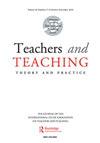‘Your past prepares you for who you will become’: reoccurring themes in the individual pasts of maker education teachers
IF 1.9
2区 教育学
Q2 EDUCATION & EDUCATIONAL RESEARCH
引用次数: 0
Abstract
ABSTRACTMaker education offer numerous potential benefits for student learning; however, we currently lack an understanding of the ways in which educators integrate these pedagogies into regular practice. This qualitative study examines the background and motivations of 12 educators involved in makerspace initiatives at their respective schools in Israel. Through a thematic analysis of interviews, this study presents several overlapping characteristics of teachers who chose maker education as their way of teaching, to reveal the conditions under which maker educators are created naturally, and the features and attitudes that characterise them. Recognising these intersecting characteristics can enable schools to provide essential support systems for prospective maker educators.KEYWORDS: Maker educationmaker teachersmakingformal educationteaching methods AcknowledgmentsI would like to thank all the makers who agreed to participate in this research, and that are ready to share and dedicate their lives to improving the formal education system in Israel with the intention to influence and create a better future for us all.Disclosure statementNo potential conflict of interest was reported by the author(s).Additional informationNotes on contributorsRoey KafriRoey Kafri is an Israeli researcher, educator, and maker who leads the program for ‘maker education leaders’ at ‘beit-berl’, Israel’s leading teacher college. His research focuses on maker education teachers, and teacher training. Roey specialises in innovative pedagogy and in ‘learning by doing’. He guides and accompanies schools, educational networks, and organizations in integrating the making approach and incorporating innovative pedagogy into their educational frameworks. Roey is also an orchestra conductor, and holds a degree in art and an M. Ed in educational leadership. He imparts his knowledge of these diverse areas of expertise in his lectures and workshops for educators and administrators all over the world.“你的过去为你将来成为什么样的人做准备”:创客教育教师个人过去中反复出现的主题
摘要创客教育为学生的学习提供了许多潜在的好处;然而,我们目前对教育者将这些教学法融入日常实践的方式缺乏了解。本定性研究考察了以色列12名教育工作者在各自学校参与创客空间计划的背景和动机。本研究通过访谈的专题分析,揭示了选择创客教育作为教学方式的教师的几个重叠特征,揭示了创客教育者自然产生的条件,以及他们的特征和态度。认识到这些交叉的特征可以使学校为未来的创客教育者提供必要的支持系统。致谢致谢致谢致谢致谢致谢致谢致谢致谢致谢致谢致谢致谢致谢致谢致谢致谢致谢致谢致谢致谢致谢致谢致谢致谢致谢致谢致谢致谢致谢致谢致谢致谢致谢致谢致谢致谢致谢致谢致谢致谢致谢致谢致谢致谢致谢致谢致谢致谢致谢致谢致谢致谢致谢致谢致谢致谢致谢致谢致谢致谢致谢致谢致谢致谢致谢致谢致谢致谢致谢致谢致谢致谢致谢致谢致谢致谢致谢致谢致谢致谢致谢致谢致谢致谢致谢致谢致谢致谢致谢致谢致谢致谢致谢致谢致谢致谢致谢致谢致谢致谢致谢致谢致谢致谢致谢致谢致谢致谢致谢致谢致谢致谢致谢致谢致谢致谢致谢致谢致谢致谢致谢致谢致谢致谢披露声明作者未报告潜在的利益冲突。roey Kafri是一名以色列研究人员、教育家和创客,他在以色列领先的师范学院beit-berl领导“创客教育领袖”项目。他的研究重点是创客教育教师和教师培训。罗伊专注于创新教学法和“边做边学”。他指导并陪伴学校、教育网络和组织整合制作方法,并将创新教学法纳入其教育框架。罗伊也是一名管弦乐队指挥,拥有艺术学位和教育领导硕士学位。他在为世界各地的教育工作者和管理人员举办的讲座和研讨会上传授了他在这些不同领域的专业知识。
本文章由计算机程序翻译,如有差异,请以英文原文为准。
求助全文
约1分钟内获得全文
求助全文
来源期刊

Teachers and Teaching
EDUCATION & EDUCATIONAL RESEARCH-
CiteScore
4.20
自引率
7.40%
发文量
71
期刊介绍:
Teachers and Teaching: theory and practice provides an international focal point for the publication of research on teachers and teaching, in particular on teacher thinking. It offers a means of communication and dissemination of completed research and research in progress, whilst also providing a forum for debate between researchers. This unique journal draws together qualitative and quantitative research from different countries and cultures which focus on the social, political and historical contexts of teaching as work. It includes theoretical reflections on the connections between theory and practice in teachers" work and other research of professional interest.
 求助内容:
求助内容: 应助结果提醒方式:
应助结果提醒方式:


